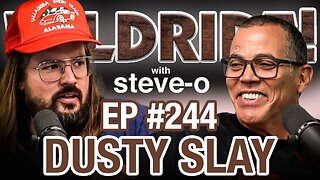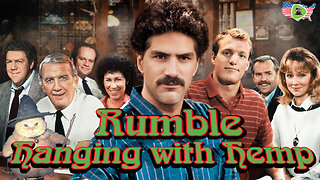Premium Only Content

Four Year War Plans And Screw Deals
The first half of this sketch (the “WW2 Job Placement Services” commercial) was partially inspired by the frustrations a troupe member of ours had in applying for a job in human factors engineering. While the application for the job itself was relatively easy, the rest of the process, particularly the quality and timeliness of the responses from Human Resources, was atrocious. If he heard back from the firm at all, it was usually between two to four months. Most of the time the response was in the form of a vaguely worded rejection letter (reading something nebulous like “after careful consideration of your experience and professional background, we regret to inform you that you have not been selected for this position”). It was typically sent from a “Do Not Reply” email address, so there was no chance to get any sort of feedback from a human as to why the qualifications were insufficient, when it appeared to him from the job requisition that he clearly was qualified. Complicating matters is the fact that Human Resources doesn’t know skill sets, so they outsource their resume reviews to artificial intelligence and leave it to AI to filter out resumes based on keywords rather than by selecting resumes using their own sense of judgement (such as it is). It seems to us here at CoBaD that Human Resources departments are one of the biggest impediments to a partnership between a potential employee and an employer because they do not give applicants the personal attention and respect they deserve.
None of this of course would be possible without hiring managers. This troupe member has had years of experience in the engineering field, and has interacted with many managers. While they may have been good engineers, they were for the most part dreadful mentors. It seems to us that if these managers would get some training and learn how to be decent mentors, and show they care about the growth of their protégés rather than obsessing about their own careers (the protégés are in fact the future of the company), they would be able to retain their employees and there wouldn’t be a need to call upon Human Resources to backfill vacancies. However, since Human Resources, as discussed above, have shown they are not doing a very good job at responding to their company’s needs, you have a cyclical problem that keeps on getting worse. General Dresden is simply taking a hyper-aggressive approach to job placement to free up the logjam.
The second half of this sketch was partially inspired by a parenthetical expression from the Introduction of John Steinbeck’s 1939 novel “The Grapes of Wrath” written by Robert DeMott. In a parenthetical note on page xxii, Mr. DeMott noted “([the writer] Jackson. J. Benson was the first to recognize that, in a convoluted and unconventional way, the federal government underwrote Steinbeck’s research [into the demonstration camps].”) If this is true and the government knew Steinbeck was investigating the dire conditions of the migrant camps, why didn’t they clean them up right away rather than waiting for the novel to be released? The only reason we here at CoBaD think that FDR deliberately did this because he wanted to look like a bad boy to “dirty up” his image.
Many historians think of Franklin Delano Roosevelt (1882-1945) as one of American’s greatest presidents. We here at CoBaD couldn’t disagree more. We feel that a good president should be proactive, and, when this is not possible, reactive. FDR was neither. FDR’s (and Congress’s) isolationistic stance (and the ensuing war that was the direct result of their isolationist policies) led to the unnecessary loss of millions of lives both home and abroad, and his (partially unconstitutional) New Deal did little to dig the country out of its economic slump (most historians seem to think the war did more to get the country out of its slump than Roosevelt’s policies did). So this sketch attempts to “pulls aside the curtain” and take a look at the buffoonish adulterer FDR who was, we believe, dangerously naïve in foreign affairs and grossly inept in domestic affairs. His extramarital affairs, however, are another story. Based on the number he had, he apparently was quite successful at those.
Dresden: “We’ll teach you the FDR Method of fighting fires: 1. Lock all windows and doors, totally isolating ourselves from the outside world, 2. Once a fire starts, wait 10 years in order for it to rage completely out of control…” - In a clear jab at Roosevelt, John F. Kennedy, in his Cuban Missile Crisis speech on October 22, 1962, stated “The 1930s taught us a clear lesson: aggressive conduct, if allowed to go unchecked and unchallenged, ultimately leads to war.”
Dresden: “To bide the time, sequester the fire crew in the West Wing of the fire station and play the acronym version of Scrabble for 16 hours a day,” - Refers to Roosevelt’s “alphabet agencies;” government agencies specifically set up by the President. Most were known only by their acronyms (e.g., CCC, FCC, FDIC, NLRB, SEC, TVA, etc.). About sixty-nine such agencies were created during Roosevelt’s tenure (1933-1945). The Scrabble game drawing was in fact a tribute to a 1930s editorial cartoon lampooning the alphabet agencies.
Dresden: “And finally, sign a post-fire peace treaty with our pyromaniacs, politely requesting that if they do wish to start another fire in the future, to please keep it confined to their side of their 302 watchtower barbed wire festooned fence, ornamented with anti-tank mines instead of shrubs and embellished by beds of nails instead of roses to keep its beloved proletariat rabbits and Secret Squirrels from escaping to the west to decadently gorge themselves on lettuce and carrots.” – The “fence” here is a clear reference to the Berlin Wall.
Dresden: “We don’t want to have to respond to another one of those wild Eastern Bloc parties because Stalin foolishly tried to deep fry a frozen dissident, setting fire to all the gulags in the street. You wouldn’t want to make us lodge an impotent protest with the U.N. now, would you?” - This line is a passing reference to another one of FDR’s foreign policy blunders; his blind trust of “Uncle Joe” Stalin. For example, when FDR was warned of the dangers of Stalin by his former Soviet ambassador William Bullitt, Jr., FDR replied, “I just have a hunch that Stalin is not that kind of a man…I think that if I give him everything I possibly can and ask for nothing from him in return, noblesse oblige, he won't try to annex anything and will work with me for a world of democracy and peace.” (Americanthinker.com, 2016). Having read all three volumes of Alexander Solzhenitsyn’s “The Gulag Archipelago,” we here at CoBaD can safely say that Roosevelt was even dumber than we depicted him in this sketch.
FDR: “Yes, that’s right. This IS Secret Squirrel stuff, you know.”
John: “Well if this is ‘Secret Squirrel stuff,’ then why the hell are you telling me all this?”
Whose idea was it to keep FDR fully informed of his former name? Honestly, presidents should never be allowed to handle calcified information.
FDR: “Oh. Well, anyway, please do sit down, Mr. Steinbeck.” (motions to chair)
John: “Thank you, Mr. President.”
(John squats on the ground.)
FDR: “No, no, not on your hams. On the chair…”
In “The Grapes of Wrath,” the men do a lot of “sittin’ on their hams,” i.e., squatting, vice sitting on the ground or on a chair.
John: “Well, like I said on the phone, I’m a novelist from Sallisaw, Oklahoma…” - John Steinbeck was actually from Salinas, California. Tom Joad, the main character from “The Grapes of Wrath,” was from Sallisaw.
John: “My latest serialization, 'The Grapes of Wrath,' concerned the hero’s trials and tribulations encountered during a trip with his fambly …” - The Joads always pronounced the word “family” as “fambly.” It is spelled as such in the novel.
John: ”…Anyway, whilst on this fambly trip, our hero is simultaneously engaging in the life and death struggle of a roadside removal and replacement of a 1925 Dodge con-rod.” – From Chapter 16 of “The Grapes of Wrath.” The 1925 Dodge belonged to the Joads’ traveling companions, Ivy and Sairy Wilson. In a continuation of the roadside removal and replacement theme, the Joads would later jump start and fix a flat on their own car (a Hudson sedan converted into a truck) in Chapter 26.
John: “The editor of the “Shade Tree Post-Dispatch,” who also happens to be the chief mechanic and lead singer of Downtown Gas …”
FDR: “Oh, yeah, I’ve seen his infomercial. Very enterprising man, that Mr. Joel.”
For more on this reference, see the “Stock Market” sketch.
FDR: “Yes, just like one of my plain and simple addresses to the nation. Just be natural. Just look right into Fireside Camera number 1.”
John: “Camera 1? Wasn’t he “Lamberted” after the Rimsky-Korsakov sketch?”
For more on the fate of poor Camera 1, see the “Daydream Bleacher” and “Booth Estranges Diction” sketches. For more on Lambert, see the “Daydream Bleacher,” “I Tried Improvisation, Then I Was Perturbed” and “Booth Estranges Diction“ sketches.
FDR: “Alright, Camera 4 then. Anyway, just look into the camera and begin when you’re ready...” - This segment of the skit was inspired by Jim Hacker’s classic ministerial broadcast rehearsal in “The Ministerial Broadcast” episode of “Yes, Prime Minister.” The hand gestures was inspired by the extremely ridiculous use of hands CoBaD has seen speakers make at conferences.
John: “The Joads lost the farm to a cattle millionaire.” - The “millionaire” referred to here is the Shawnee Land and Cattle Company (see Chapter 6).
John: “The bank said the Joads gotta move away from there. Said California is the place they oughta be. So they loaded up the truck and they moved…”
In reading “The Grapes of Wrath,” we couldn’t help but see similarities between John Steinbeck’s classic novel and the 1960s sitcom “The Beverly Hillbillies.” For example, take the reaction of the senior members of the household when learning of their respective moves. In “The Beverly Hillbillies,” Granny sat in the rocking chair on the porch of old house and stubbornly refused to budge from her rocking chair and get on the truck. So Jed and Jethro picked up the chair (with Granny still in it), loaded in onto the back of the truck (a converted Oldsmobile roadster) and drove her to California.
In Chapter 10 of “Grapes of Wrath,” it was Grampa Joad who was the stubborn one. He refused leave Uncle John’s house and get on the truck, so Ma Joad slipped a couple of tablespoons of some “soothin’ sirup [sic]” into his coffee (used to put Tom’s 10 year old brother Winfield to sleep when Winfield had bad earaches). When Grampa Joad fell asleep, the family loaded him into the back of the truck (a converted Hudson Super-Six sedan) and drove him to California.
John: “My dear sweet Lord Jesus asleep in a manger!” - Ma Joad’s expression when her son Winfield told her that his sister Ruthie told some kids about Tom murdering two men (Chapter 28). We here at CoBaD love that expression.
FDR: “Nah, I’ll stick with a profile shot. My full face view ain’t worth a plug nickel, if you know what I mean.” - True, FDR’s full face view ain’t worth a plug nickel. FDR’s PROFILE, however, is worth 10 cents. FDR’s profile is on the U.S. dime.
FDR: “Yes, folks such as yourself who are reshaping the very definition of feminism. Folks who understand the value of women in society. Enough to, say, plagiarize the research of a woman whom, God willing, shall remain nameless, and publish the novel without giving her any credit…” - Alludes to charges made by Sondra Babb (1907-2005), who claimed John Steinbeck took her notes on the tent camps of the Dust Bowl migrants to California, and wrote “Grapes of Wrath” without giving her any credit. The book, titled “Whose Names Are Unknown,” was written in the 1930s and accepted by a major publisher shortly afterwards. However, because of its similarities to the “The Grapes of Wrath,” the book was shelved. “Whose Names Are Unknown” was finally published in 2004.
FDR: “And the type that employs their ambitious, firebrand, independent-minded wife as a maid, typist, ghost writer, proofreader and press agent, valuing their fingers to the bone,” John’s wife Carol thought of the title of the novel. Carol’s work did not go unnoticed; John in fact dedicated “Grapes of Wrath” to her.
FDR: “…then once the money starts rolling in, he starts fooling around behind her back with a 20 something year old Hollywood singer then demands a divorce. Brilliant. I tell ya, being a bad boy is almost second nature to you folks.” – The “Hollywood singer” referred to here was Gwyndolyn "Gwyn" Conger, who would later become John Steinbeck’s second wife after his divorce from Carol in 1943.
FDR: “I want hobos in the soup kitchens all around the country to say to one other ‘Brother, can you spare a Roosevelt’ in that same sardonic tone of voice that people referred to shantytowns as ‘Hoovervilles.’” - Reference to the 1932 song “Brother, Can You Spare a Dime?”
FDR: “Now here’s what I suggest we do. I will send J. Edgar Hoover on behalf of the Farm Security Administration out to the Joads in Beverly Hills.” – FDR’s "plot" to “dirty up” his image. See introduction paragraph above.
FDR: “We’ll round up the Joads and force them into camps. Internment camps we’ll call them…” – This is of course referring to the camps used to intern German-Americans, Italian-Americans and particularly Japanese-Americans during World War II. For more on this, see the Description in the “Produce and Direct” sketch.
FDR: “We’ll then turn the Joad place…um, sorry, what’d you call it again?”
John: “A mansion…well, an open concept designed four-plex with modular canvas walls, giant single track sliding steel doors and an elevated cleated entryway.”
FDR: “Oh. Well, anyway, we’ll run them and the three other famblies out of that railroad boxcar and turn it into Farmers’ Association’s palatial headquarters…”
A railroad boxcar is where the Joads stayed when they picked cotton in Chapter 28. Four families lived in a boxcar, one in each corner.
FDR: “We’ll then bring hundreds of migrants from central casting, rough them up, and house them with the Joads.”
John: “Hundreds?”
FDR: “Hundreds. And when I say hundreds, I mean thousands. Stuff it to the rafters. And throw in an outbreak of smallpox and a foot of standing water for good measure.”
This is more a reflection of what John Steinbeck actually saw when he toured a California migrant camp in the winter of 1938 (see Robert DeMott’s notes, page xxviii).
FDR: “Plus in addition to the pension and detail, I even get to be the first one to dip into that Ponzi scheme I just cooked up…what’s it called…”
John: “Social Security?”
FDR: “Yeah, that’s it.”
In the Sept. 7, 2011 Republican presidential debate at the Ronald Reagan Presidential Library, then Texas Governor Rick Perry famously called Social Security a Ponzi scheme. The difference between Social Security and a Ponzi scheme is that Social Security won’t fail because of a lack of investors (paying into Social Security is mandatory), but rather Social Security will fail because no one (politician, tax payer or retiree) is willing to make the sacrifice to keep the “scheme” going (raise taxes, raise the retirement age, and/or lower benefits).
John: “Yes, sir. Wherever they’s a cop beatin’ up a guy, I’ll be there!” – Reference to Tom Joad’s famous line from Chapter 28.
FDR: “Mum’s the word. Folks like us got to look out for one another. After all, you must attend to your affairs…”
John: “And you must attend to yours…”
As mentioned previously, FDR had numerous extra-marital affairs, among them, his private secretary, Marguerite LeHand, his wife’s secretary, Lucy Mercer Rutherfurd, and possibly one with Princess Märtha of Sweden. If this last affair is true, then perhaps FDR wasn’t so bad at establishing foreign relations after all. Can’t say the same for Crown Princess Märtha, though.
References:
Jay, A. and Lynn, J. (1986, January 16) Yes, Prime Minister. (Series 1, Episode 2) [TV Series Episode]. The Ministerial Broadcast. BBC2.
Kennedy, J. F. (1962, October 22). Address During the Cuban Missile Crisis.
https://www.jfklibrary.org/learn/about-jfk/historic-speeches/address-during-the-cuban-missile-crisis
Orlando, R. (2016, July 16). Americanthinker.com. FDR’s Costly Enchantment with Stalin. https://www.americanthinker.com/articles/2016/07/fdrs_costly_enchantment_with_stalin.html
Steinbeck, John (1992). The Grapes of Wrath. Penguin Books. (Original work published 1939).
Wikipedia. Alphabet Agencies. https://en.wikipedia.org/wiki/Alphabet_agencies
Wikipedia. Franklin D. Roosevelt. https://en.wikipedia.org/wiki/Franklin_D._Roosevelt
Wikipedia. John Steinbeck. https://en.wikipedia.org/wiki/John_Steinbeck
Wikipedia. Lucy Mercer Rutherfurd. https://en.wikipedia.org/wiki/Lucy_Mercer_Rutherfurd
Wikipedia. Marguerite LeHand. https://en.wikipedia.org/wiki/Marguerite_LeHand
Wikipedia. Princess Märtha of Sweden. https://en.wikipedia.org/wiki/Princess_Märtha_of_Sweden
Wikipedia. Whose Names Are Unknown. https://en.wikipedia.org/wiki/Whose_Names_Are_Unknown
--------------------
Convulsions of Birth and Death (CoBaD) is a comedy sketch troupe founded in September, 2022 that posts skits on social media covering varied topics such as art, history, literature, music, science, sports and events encountered in everyday life. The title was inspired by Henry David Thoreau’s “Civil Disobedience” (1849), an essay written as a protest against the U.S. government taking his “gift” (i.e., his taxes), and wasting it in ways in which he did not approve (e.g., war and slavery). CoBaD writes sketches in the spirit of Thoreau, but instead of strictly casting its nets outwards towards governments and figures of authority, it projects its protest inwards by taking a humorous, lightheaded look at humanity and specifically those who take the greatest gift of all, life, and senselessly and stupidly waste it on greed, narcissism, self-centeredness, petty-mindedness, arrogance, opportunism, power-grabbing, quid pro quo, the status quo, ulterior motives, and the most horrid waste of all, social media.
-
 56:08
56:08
State of the Second Podcast
21 hours agoWhat does the next 4 years look like for the suppressor market? (Ft. Rugged Suppressors)
79.3K13 -
 29:08
29:08
The Lou Holtz Show
15 hours agoThe Lou Holtz Show Ep 21 | Enes Kanter Freedom: A Voice For Human Rights #podcast
74.6K3 -
 28:31
28:31
America First Policy Institute
22 hours agoAmerica First Policy Institute Gala Donald Trump, Elon Musk & Sylvester Stallone Ignite the Movement
43.5K18 -
 4:36
4:36
BIG NEM
12 hours agoThe Sad Truth About How Our Cannabis is Grown
44.2K15 -
 3:07:08
3:07:08
Price of Reason
17 hours agoMainstream Media FEARS Extinction! Gladiator 2 Review! New DnD SCANDAL!
67.9K10 -
 8:23:44
8:23:44
Fresh and Fit
13 hours agoIsrael-Hezbollah Ceasefire & Reacting To Death Threats On X
170K71 -
 1:11:10
1:11:10
Steve-O's Wild Ride! Podcast
5 days ago $10.43 earnedDusty Slay Went From Selling Pesticides To Having A Netflix Special - Wild Ride #244
61.7K3 -
 1:16:02
1:16:02
CocktailsConsoles
11 hours agoBE PART OF THE GAME!!| Death Road to Canada | Cocktails & Consoles Livestream
43.1K3 -
 8:19:28
8:19:28
Phyxicx
13 hours agoWe're streaming again! - 11/26/2024
36.5K -
 6:49:31
6:49:31
GamingWithHemp
13 hours agoHanging with Hemp #103
52K3